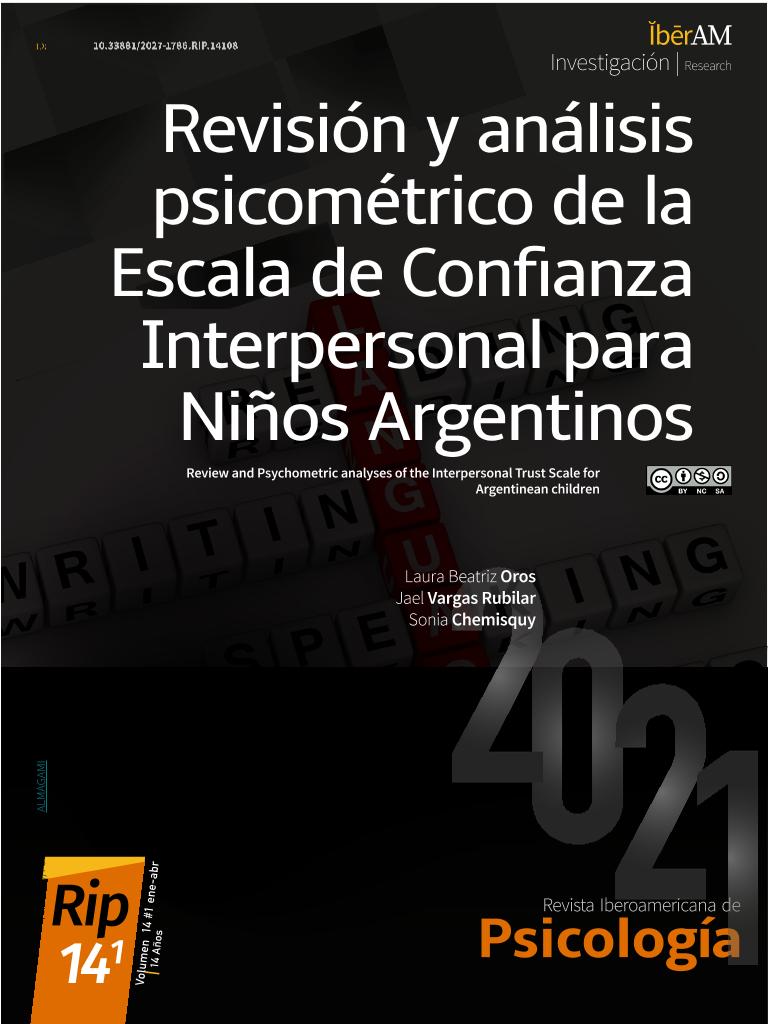Artículo
En el año 2004, Sacchi publicó una escala para evaluar la confianza interpersonal en niños y niñas argentinos (ESCI-niños). Su trabajo constituyó la primera iniciativa realizada en el país para abordar el estudio sistemático de esta variable que resulta crucial para el desempeño social saludable. No obstante, los resultados psicométricos preliminares no fueron completamente adecuados y la autora sugirió retomar su análisis en futuras investigaciones. Así, el objetivo del presente trabajo fue revisar y analizar psicométricamente la ESCI-niños a fin de aportar nuevas evidencias de su confiabilidad y validez. Primeramente, se reemplazó la escala de respuesta Si-No por una de cinco puntos, y se eliminaron los ítems de relleno. En segundo lugar, se administró el instrumento a 343 niños y niñas (M= 10,93; DE= 1,24), estudiantes desde cuarto a séptimo grado de la escolaridad primaria en la provincia de Misiones, Argentina. El Análisis Factorial Exploratorio indicó una estructura binaria “Confianza-Desconfianza”. Cada factor incluye 8 ítems y presenta una consistencia interna admisible para población infantil (ω Confianza= .69; ω Desconfianza= .67). Para estudiar la validez nomológica, la ESCI-niños fue correlacionada con una medida de apego, observándose relaciones significativas entre Confianza y Apego Seguro (r = .27; p < .001), y entre Desconfianza y estilos de Apego Evitativo (r = .32; p < .001) y Ansioso/Ambivalente (r = .32; p < .001). Se concluye que la ESCI-niños muestra un funcionamiento aceptable en población infantil argentina, aunque sería recomendable continuar explorando otras propiedades psicométricas. Se discuten limitaciones y orientaciones para futuros estudios. In 2004, Sacchi published a scale to assess interpersonal trust in Argentine children (ESCI-children). His work constituted the first initiative carried out in the country to address the systematic study of this variable that is crucial for healthy social performance. However, the preliminary psychometric results were not completely adequate and the author suggested retaking her analysis in future research. Thus, the objective of this study was to review and psychometrically analyze the CSEC-children in order to provide new evidence of its reliability and validity. First, the Yes-No response scale was replaced by a five-point scale, and the filler items were eliminated. Second, the instrument was administered to 343 boys and girls (M= 10.93; SD= 1.24), students from fourth to seventh grade of primary school in the province of Misiones, Argentina. The Exploratory Factor Analysis indicated a binary structure “Trust-Distrust”. Each factor includes 8 items and has an acceptable internal consistency for the child population (ω Confidence= .69; ω Mistrust= .67). To study the nomological validity, the CSEC-children was correlated with an attachment measure, observing significant relationships between Trust and Secure Attachment (r = .27; p < .001), and between Mistrust and Avoidant Attachment styles (r = . 32; p < .001) and Anxious/Ambivalent (r = .32; p < .001). It is concluded that the CSEC-children shows an acceptable performance in the Argentine child population, although it would be advisable to continue exploring other psychometric properties. Limitations and directions for future studies are discussed.
Revisión y análisis psicométrico de la Escala de Confianza Interpersonal para Niños Argentinos
Título:
Review and Psychometric analyses of the Interpersonal Trust Scale for Argentinean children
Fecha de publicación:
11/2021
Editorial:
Corporación Universitaria Iberoamericana
Revista:
Revista Iberoamericana de Psicología
ISSN:
2027-1786
e-ISSN:
2500-6517
Idioma:
Español
Tipo de recurso:
Artículo publicado
Clasificación temática:
Resumen
Palabras clave:
CONFIANZA INTERPERSONAL
,
AUTOEVALUACIÓN
,
NIÑOS
,
CONFIABILIDAD Y VALIDEZ
Archivos asociados
Licencia
Identificadores
Colecciones
Articulos(CIIPME)
Articulos de CENTRO INTER. DE INV. EN PSICOLOGIA MATEMATICA Y EXP. "DR. HORACIO J.A RIMOLDI"
Articulos de CENTRO INTER. DE INV. EN PSICOLOGIA MATEMATICA Y EXP. "DR. HORACIO J.A RIMOLDI"
Articulos(SEDE CENTRAL)
Articulos de SEDE CENTRAL
Articulos de SEDE CENTRAL
Citación
Oros, Laura Beatriz; Vargas Rubilar, Jael Alejandra; Chemisquy, Sonia Noemí; Revisión y análisis psicométrico de la Escala de Confianza Interpersonal para Niños Argentinos; Corporación Universitaria Iberoamericana; Revista Iberoamericana de Psicología; 14; 1; 11-2021; 83-92
Compartir
Altmétricas




